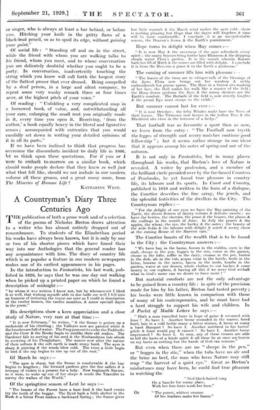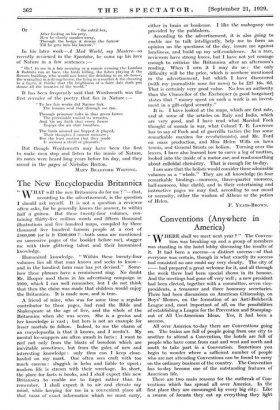A Countryman's Diary Three Centuries Ago
THE publication of both a prose work and of a selection of the poems of Nicholas Breton draws attention to a writer who has almost entirely dropped out of remembrance. To students of the Elizabethan period his works have always been known, but it is only by one or two of his shorter pieces which have found their way into our Anthologies that the general reader has any acquaintance with him. The diary of country life which is so popular a feature in our modern newspapers makes one of its earliest appearances in his pages.
In the introduction to Fantasticks, his last work, pub- lished in 1626, he says that he was one day out walking when he picked up a printed paper on which he found a description of midnight "by whom it was written I know not, but by whomsoever I liked it so well, that wishing myselfe able to doe halfe soe well I fell into an humour of imitating the veyne soe neer as I could in description of the twelve houres, the twelve monthes, & somw speciall dayes in the yeere."
• His descriptions show a keen appreciation and a close study of Nature, very rare at that time :- " It is now February," he writes, " & the Sunne is gotten up a oockstride of his climbing ; the Valleyes now are painted white & the brookes are full of water. The Frog goes out to seeke the Paddocke slid the Crow & the Hooke begin to mislike their old makes. The Gardener fats to sorting of his seed & the Husbandman fall afresh to scowring of his Ploughshare. The waters now alter the nature of their softnes & the soft earth is made stony hard. The ayre is sharp & piercing & the winds blow cold. The trees a little begin to bud & the sap begins to rise up out of the root."
Of March he says :— " The ayre is sharp, but the Sunne is comfortable & the hay begins to lengthen ; the forward gardens give the fine Ballets & a nosegay of violets is a present for a lady. Now beginneth Nature, as it were, to wake up out of her sleepe & sende the Traveller to survey the walkes of the World."
Of the springtime season of Lent he says :- " The beasts of the Forest have a bare feed & the hard crusts try the teeth of the beggar. The Byrd bath a little shelter in the Bush & a bitter Frost makes a backward Spring ; the Sunne gives
but little warmth & the March wind makes the ayre cold—there is nothing pleasing but Hope that the dayes will lengthen & time will be more comfortable. I conclude--it is an uncomfortable season, the Heaven's frown & the Earth's punishment."
Hope turns to delight when May comes :- " It is now May & the sweetness of the ayre refresheth every spirit; the sunny beames bring forthe faire Blossoms & the dripping clouds water Flora's garden. It is the month wherein Nature hath her fill of Mirth & the senses are filled with delight. I conclude it is from the Heavens a grace & to the Earth a gladnesse."
The coming of summer fills him with pleasure :- " The leaves of the trees are in whisper-talk of the blessings of the Ayre. Flora now brings out her wardrop & richly embroidereth her grecne apron. The Hare in a furrow sits washing of her face, the Bull makes his walk like a master of the field ; the Hony-dewes perfume the Ayre & the sunny showers are the Earth's comfort. The Battelle of the field is now strictly fought° & the proud Rye must stoope to the sickle."
But summer cannot last for ever :- " It is now October ; the lofty Windes make bare the Trees of their leaves. The Titmouse now keepes in the hollow Tree & the Blackbird sits close in the bottoms of a hedge."
That football was as favourite a sport then as now, we learn from the -entry : " The Football now tryeth the legges of strength and merry matches continue good fellowship " ; but it seems rather strange to our ideas that it appears among his notes of spring and not of the autumn.
It is not only in Fantasticks, but in many places throughout his works, that Breton's love of Nature is revealed. A writer by profession, and a member of the brilliant circle presided over by the far-famed Countess of Pembroke, he yet found true pleasure in country life, its labours and its sports. In Court and Country, published in 1618 and written in the form of a dialogue, the Courtier describes the fine array, the jewels, and the splendid festivities of the dwellers in the City. The Countryman replies :- " For the delight of our eyes we have the May-painting of the Earth, the divers flowers of dainty colours & delicate sweets ; we have the berries, the cherries, the pease & the beanes, the plums & the codlings in the month of June. In July the peares & the apples, the wheat, the rye, the barley & the oates ; the beauty of the wide fields & the labours with delight & mirth & merry cheer at the coming Home of the Harvest cart."
The Courtier boasts of the wealth that is to be found in the City ; the Countryman answers :- " We have hay in the bane, horses in the stables, oxen in the stall, sheepe in the pen, hogges in the stie, come in the garner, cheese in the lofte, mflke in the dairy, creame in the pot, butter in the dish, ale in the tub, segue vitae in the bottle, beefe in the brine, brawn in the sawce, bacon in the roofe, hearbs in the garden, water at our doores, whole clothes to our backes & some money in our cophers, & having all this if we serve God withall what in God's name can we desire to have more 1 " But material comforts are not the only advantage to be gained from a country life : in spite of the provision made for him by his father, Breton had tasted poverty ; his books were little known in comparison with those of many of his contemporaries, and he must have had a hard struggle to support his wife and children. In A Packet of Madde Letters he says :- " Hath a man travelled farre in hope of gaine & returned with losse ? So have I. Another beene wounded in the warres, fared hard, lain in a cold bedde many a bitter storme, & been at many a hard Banquet ? So have I. Another indebted to his hartes' griefe & faille would pay & cannot ? So have I. Another beene imprisoned ? So have I. In sum, any of these crosses are able to kill the harte of a kinde spirit & all these lie at once soe heavie on my harte as nothing but the hande of God can remoue."
But even when there are no " sheepe in the pen," or " hogges in the stie," when the tubs have no ale and the brine no beef, the man who loves Nature may still reap " the harvest of a quiet eye." Great as Breton's misfortunes may have been, he could find true pleasure in watching the
" litel black-haired cony On a bancke for sunny place, With her fore-feete wash her face."
Or "The purest, whitest swanne Of.her feathers.make her fanne." Or " the subtil fox,
After feeding on his prey, How he closely sneakes away, Through the hedge & down the furrow Till he gets into his burrow."
In his later work—A Mad World, my Masters—so recently reviewed in the Spectator, he sums up his love of Nature in a few sentences :- " Oh ! to see in a fair morning or a sunnie evening the Lambes & Rabbits run at bace, the birds billing, the fishes playing & the flowers budding, who would not leave the drinking in an ale-house, the wrangling in a dicing-house, the lying in a market & the cheating in a fayre, & thinke that the brightness of a faire daie doth put• doune all the beauties of the world."
It has been frequently said that Wordsworth was the first revealer of the poetry that lies in Nature :- " To her fair works did Nature link
The human soul that through me ran.
Through primrose tufts in that green bower The periwinkle trailed its wreaths, And 'tis my faith that every flower Enjoys the air that breathes.
The birds around me hopped & played, Their thoughts I cannot measure ; But the least motion that they made It seemed a thrill of pleasure."
But though Wordsworth may have been the first to make men stop and listen to the music of Nature, its notes were heard long years before his day, and they sound in the pages of Nicholas Breton.
MARY BRADFORD WHITING.













































 Previous page
Previous page